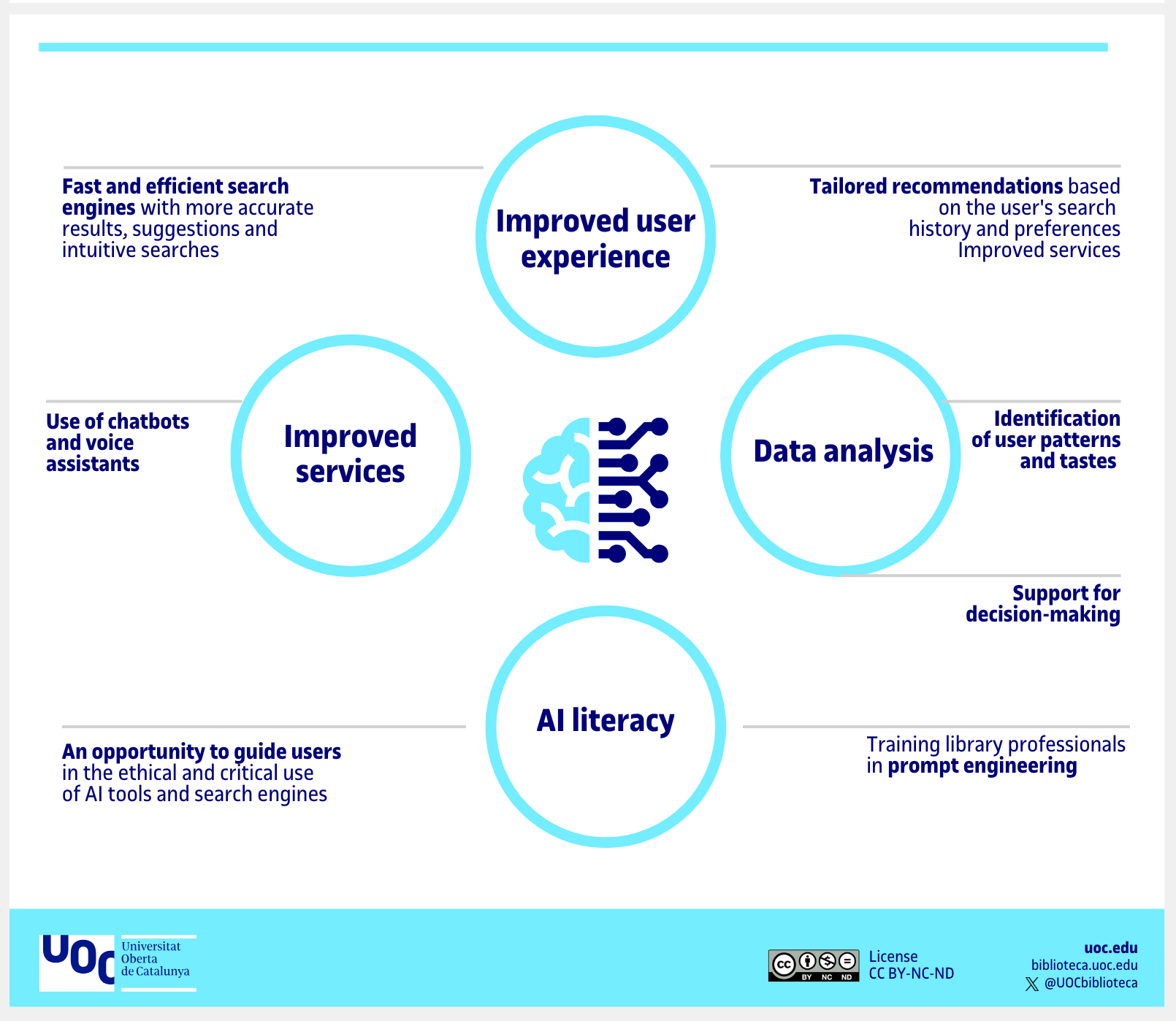AI and innovation: a new horizon
Keeping up to date
News reports produced by the Library
Take a look at the UOC Library's leading news reports on artificial intelligence.
Library guides
A section containing guides on artificial intelligence put together by the UOC Library.
Resources from the Library's collection on AI
A selection of books, articles and digital resources on artificial intelligence from the UOC Library.
Articles, reports and content from other institutions
A selection of articles of interest from renowned sources to give you an up-to-date perspective on the latest breakthroughs in AI.
Prompts: guides and resources
Prompts are the instructions you give the generative artificial intelligence (GAI) tools, such as Copilot, ChatGPT or Gemini. What you put in affects how accurate and relevant the responses are. If you want to make the most of these tools, it's vital you know how to write your prompts.
Content produced by the Library
Content from other sources
AI in the Library collection
| What does it do? | ||||||
| Where? | How can it help? | Answers questions | Summarizes contents | Searches | Recommends | How does it work? |
|
Collection with more than 100,000 digital books. |
The AI assistant eLi can answer your questions about the contents of a book and lets you see the questions asked by other readers. | - | - | Let us explain! | ||
|
More than a million statistics on one website. |
Research AI can respond to your questions and provide access to the graphs, reports and infographics it's used. | - | Let us explain! | |||
| Taylor & Francis Online A selection of articles which encompasses all of the UOC's fields of study. |
The Recommended articles option provides AI-driven suggestions for articles related to the document you're consulting. | - | - | Let us explain! | ||
|
The information you are looking for with a wide variety of formats and subject areas. |
The Research Assistant recommends keywords, summarizes documents and suggests sources of information and related subjects. | - | Let us explain! | |||
|
Digital books, articles and videos about computing, technology, multimedia and business. |
O'Reilly Answers lets you ask it technical questions and can recommend videos, books, courses and other content where you can find the answer. | - | Let us explain! | |||
|
Communication & Mass Media Complete One of the most complete collections on communication and media. |
The AI Insights option summarizes key ideas from articles on the results page to help you choose the one you want to look at. The search engine also lets you look for resources using natural language. |
- |
- |
Let us explain! | ||
|
Collection of analytical articles on regional and global economic developments.
|
The AI Insights option summarizes key ideas from articles on the results page to help you choose the one you want to look at. The search engine also lets you look for resources using natural language. |
- |
Let us explain! | |||
|
A collection specialized in hospitality and tourism.
|
The AI Insights option summarizes key ideas from articles on the results page to help you choose the one you want to look at. The search engine also lets you look for resources using natural language. |
- |
Let us explain! | |||
|
A global solution for jurists with legislation, case law and administrative doctrine. |
The Sibila tool lets you identify the key concepts, regulations and sentencing from the text or document you give it. The FichasIA option summarizes case law and administrative doctrine so you can decide what documents you want to look at. |
- |
Let us explain! | |||
|
Manuals with in-depth analyses of current regulations.
|
The Sibila tool lets you identify the key concepts, regulations and sentencing from the text or document you give it. The FichasIA option summarizes case law and administrative doctrine so you can decide what documents you want to look at. |
- |
Let us explain! | |||
|
A legal platform with legislation, case law and practical guides. |
AI has been added to this legal information platform. You can check out the summaries of case law via the Análisis del caso option. It also offers suggestions for content related to the document you're looking at. |
- |
Let us explain! | |||
|
A platform with digitized journals and books on humanities and social sciences. It contains millions of images. |
Currently a beta, it optimizes the search by providing smart suggestions and summaries so you can find relevant content quickly. | It is necessary to join the trial. | ||||
|
Bibliographical and bibliometrical database. |
When you perform a basic or advanced search in WoS, a list of suggested keywords generated by AI algorithm will appear at the top. |
- |
- |
- |
Let us explain! | |
| La Ley
A platform with legal content, including Diario La Ley. You need to request access to the platform from the Library team via The Library Replies service. |
K+IA is an assistant that can summarise articles from Diario La Ley and Carta Tributaria Opinión. You can choose how long you want the summary to be, adjust the style, and download it in PDF or Word format. |
- |
- |
- |
Let us explain! | |
Interactive features
Access Medicine
A health sciences platform with 360° anatomical images, and interactive tests to identify organs and parts of the body. It also has study cards to make revising concepts more engaging.
Academic Video Online
A video platform that lets you create clips and playlists, or add questions, exercises and discussion forums to the videos.
Primal Pictures
A 3D atlas of the human anatomy with a 360° viewer. You can explore anatomical structures, click to see the names and characteristics of body parts, or add and remove layers of tissue.
AI and projects
Artificial intelligence projects at the UOC Library
We're exploring how AI can improve the Library's services and resources, with various pilots in the trial phase. We're currently testing a The Library Replies chatbot to automate the process of responding to frequent queries and improve the user experience.
We've taken part in the pilot test of Primo Research Assistant to optimize searches and personalize the experience for the UOC community. We're also keeping a close eye on the AI features being introduced by the various companies and testing tools to make our learning resources more accessible, for example, by automatically generating videos and transcriptions.
1. The Library Replies chatbot
Evaluation of the incorporation of a chatbot to speed up responses and improve the user experience. In testing phase.
2. Primo Research Assistant pilot test(Link opens in a new window)
Generative AI for searches: optimizing search results and personalizing the experience.
3. New AI features in the Library's resources
We analyse and assess the new AI features available in the databases we subscribe to. We evaluate their usefulness so we can tell students all about them.
4. Learning resources
Testing the use of AI in videos, automatic transcriptions and alt texts to create more accessible educational content.
Four potential uses of AI in libraries

The UOC Library forms part of the Network of Spanish University Libraries (REBIUN) Artificial Intelligence Observatory, which has its finger on the pulse of AI trends at university libraries.
Ethics and social considerations
The use of AI in libraries creates opportunities, but it also raises important ethical and social questions, such as the following:
Algorithmic bias
AI systems can amplify biases in the data they use for training, which can affect the neutrality of their results.
Privacy protection
Using personal data in AI services can compromise privacy.
Transparency
Users need to know when and how AI is being used. Transparency builds trust, and enables informed decisions.
Social impact
The adoption of AI can affect interactions with the Library, leading to risks of digital exclusion (despite the benefits in terms of accessibility and efficiency).

